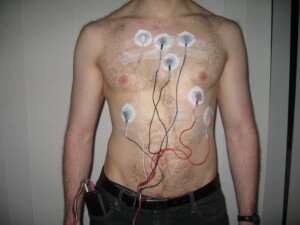
A cardiologist explains what can cause your heart to suddenly race.
We all know that anxiety or fear can cause your heart to suddenly race, but what’s behind this in the absence of any fear, anxiety, stress or anger?
What if your heart suddenly begins racing while you’re relaxing in the bathtub listening to soothing music?
Sudden Racing Heart
“If it is of sudden onset, and not associated with stress or severe anxiety, it may be an abnormal heart rhythm,” says Robert M. Davidson, MD, a cardiologist with SignatureMD.
“The most common type, especially in younger, healthy people, is called SVT (supraventricular tachycardia),” continues Dr. Davidson.
“In older people, or people with heart disease, it may be atrial fibrillation, which is similar, but irregular (the SVT is regular). SVT is usually at a rate of 130-180 beats per minute, and starts and stops suddenly.
“Atrial fibrillation (AF) typically is at a rate of anywhere from 100-150, but can be faster.
“However, the most common cause of a rapid heart beat is just a speeding up of the normal heart rhythm (sinus tachycardia), and usually is more gradual in onset and offset.
“In order to differentiate between these, a doctor might suggest a portable monitoring device, such as a Holter monitor.”

Holter monitor. Jason7825 at en.wikipedia
My mother wore a Holter monitor for 24 hours, but not because she had a sudden racing heart, but instead, to test for AF at some point following bypass surgery.
It’s a small device that’s easily hidden under one’s clothes, and involves several leads (the sticky things that a nurse places on your chest to get a heart rhythm reading).
The device detects abnormal rhythms and documents the time they occur.
My mother simply removed the device after the 24 hours and deposited it at the medical clinic, where her cardiologist later interpreted it.

Dr. Davidson is with the Division of Cardiology at Cedars-Sinai Medical Center, Los Angeles, and has been practicing for 30+ years. Areas of specialty include coronary artery disease, heart attack and palpitations.
 Lorra Garrick has been covering medical, fitness and cybersecurity topics for many years, having written thousands of articles for print magazines and websites, including as a ghostwriter. She’s also a former ACE-certified personal trainer.
Lorra Garrick has been covering medical, fitness and cybersecurity topics for many years, having written thousands of articles for print magazines and websites, including as a ghostwriter. She’s also a former ACE-certified personal trainer.
.











